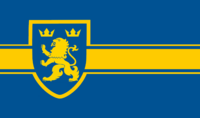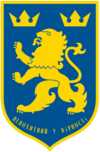Ravka
Ravkan Republic Равканська Республіка | |
|---|---|
| Motto: Непохитний у вірності | |
| Capital and largest city | Rivne |
| Official languages | Ravkan |
| Recognised regional languages | Masovian |
| Demonym(s) | Ravkan |
| Government | Unitary Parliamentary republic |
| Area | |
• Total | 835,989 km2 (322,777 sq mi) |
| Population | |
• 2022 census | 110,134,503 |
| GDP (nominal) | 2022 estimate |
• Total | ₳4,812,877,781,100 |
• Per capita | ₳43,700 |
| Currency | Lei (₳) (RL) |
| Date format | dd-mm-yyyy CE |
| Driving side | right |
| Calling code | +67 |
| ISO 3166 code | RVK |
| Internet TLD | .rvk |
Ravka, officially the Ravkan Republic (Ravkan, is a country located in southern central Eracura. It is bordered to the north by Acrea and to the west by Drazhynskia. Its southern coast borders the Sundering Sea. Ravka has a primarily temperate climate, with a warm mediterannean coast along the Gulf of Seyne to the southeast. It has a land area of 835,989 km², and a population of just over 110 million. First settled by various ethnolinguistic groups, modern Ravka was largely inhabited by proto-Slavic peoples by early antiquity. Extremely arable land allowed large agricultural settlements to grow rapidly, and easy access to rivers allowed ancient Ravkans to freely trade their excess crops with various other peoples. Ravka was fully incorporated by the Acrean Empire by 130 BCE and remained a core territory until the Empire's collapse. As a result of its successful agriculture and close relationship with neighbouring trade partners, Ravka has traditionally been a fairly wealthy society.
History
The earliest recorded inhabitants of Ravka are a combination of proto-Slavic, proto-Nordic, and proto-Latin tribes. By the first millennia BCE, proto-Slavic tribes made up the largest ethnic group in modern-day Ravka. The region came under the control of the Acrean Empire around 130 BCE, and remained a core territory of the Acrean Empire throughout its existence. Its early integration into the Empire placed the Ravkan elite in a favourable position relative to other non-Nordic cultures that had been integrated into the Empire, and uniquely so among Slavic groups. Ravkans often held favourable mercantile or political positions throughout the empire, and were favoured to serve as officials and governors in Acrea's eastern territories, which were usually populated by other Slavs. Ravkans were also one of the only non-Nordic peoples who were able to avoid Nordicisation as a policy. Ravka gradually gained its independence throughout the imperial collapse of the 10th and 11th centuries. During the Empire's dissolution, Ravka fractured into numerous polities generally ruled by dominant local noble or mercantile families. They remained separate until the unification of Ravka under the Voloshyn Dynasty of the city-state of Rivne, accomplished gradually throughout the 12th century through a combination of strategic intermarriage, integration of allied states, and conflict.

